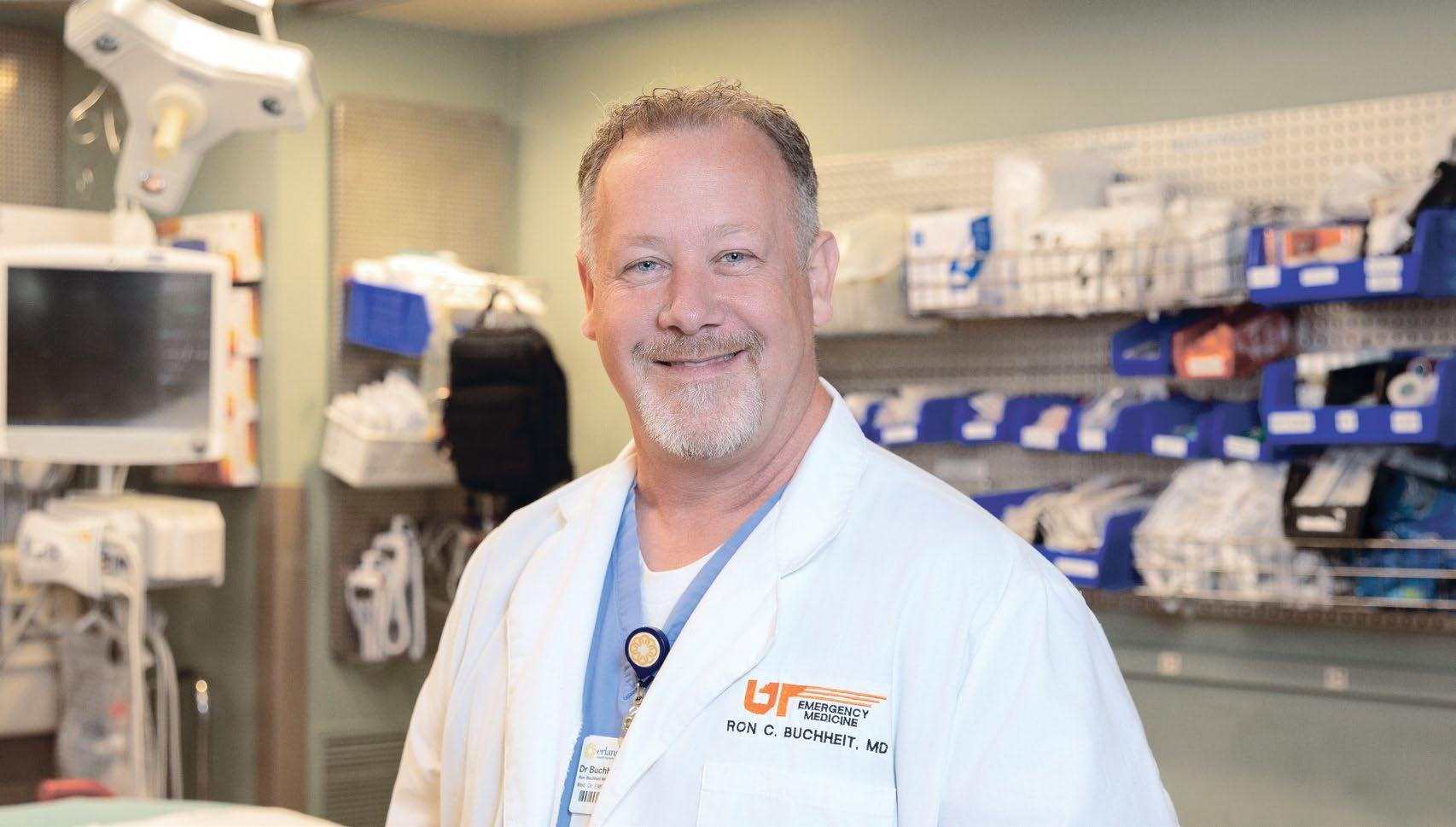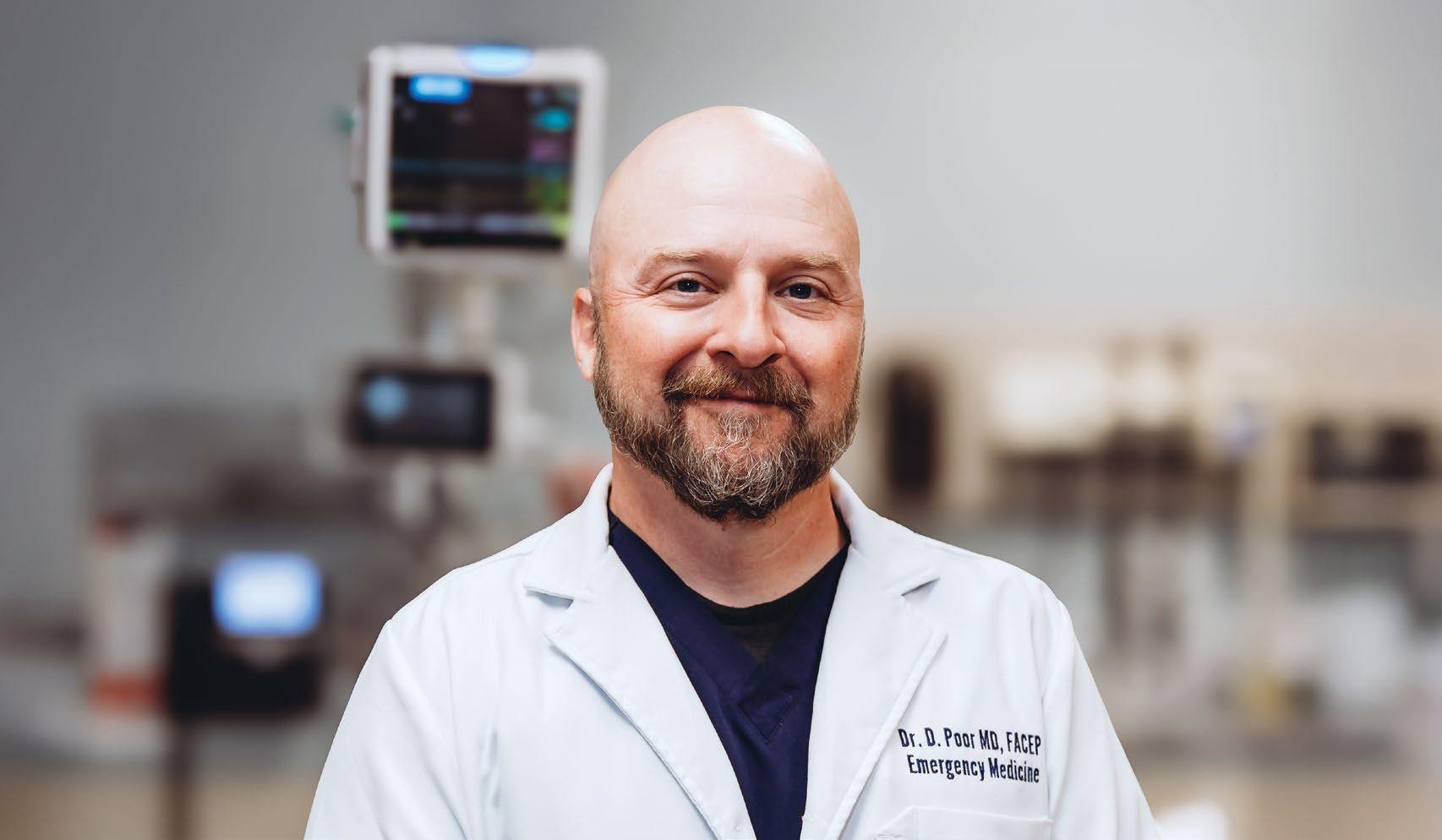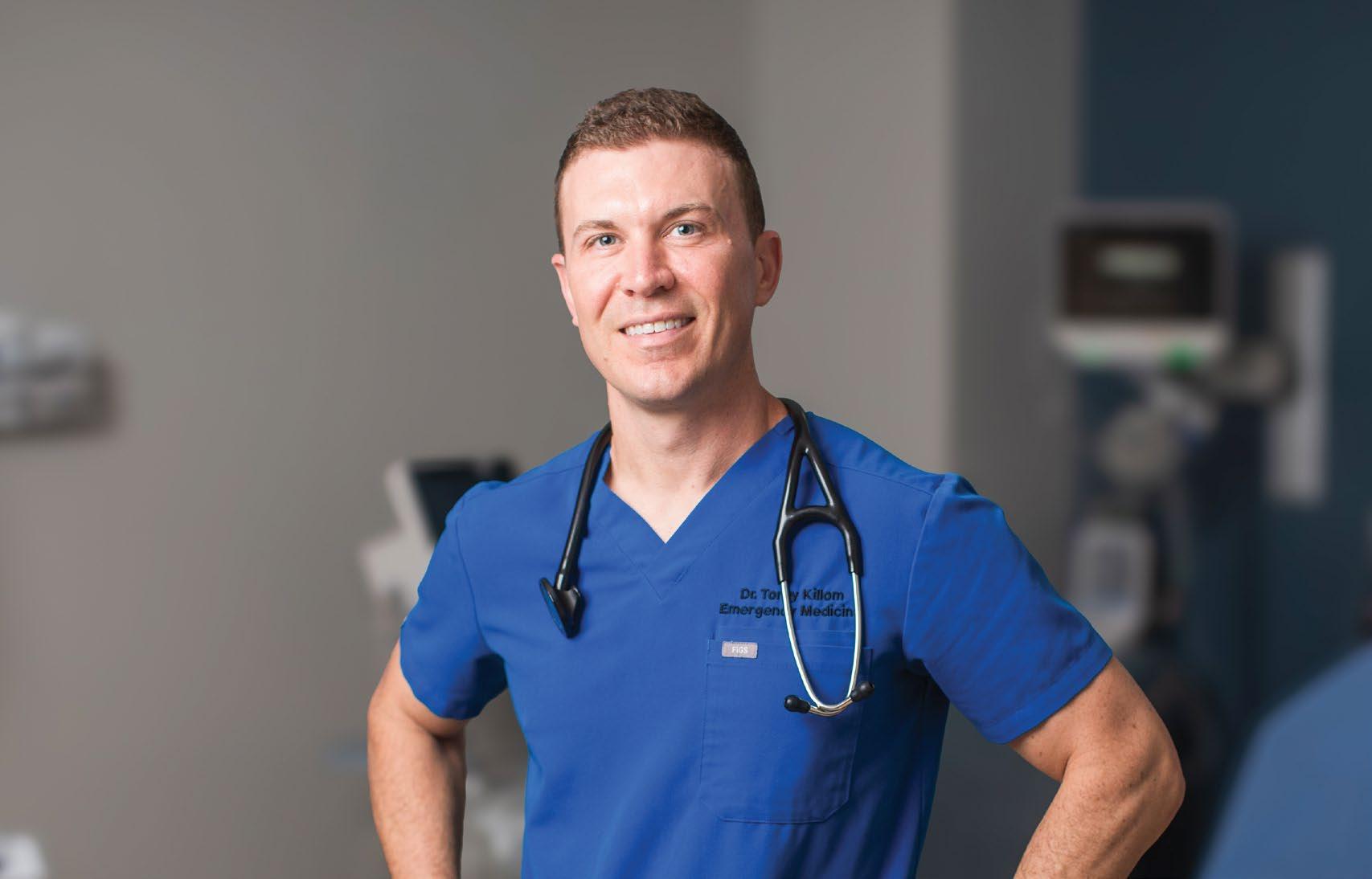
9 minute read
ER Doctors: Care During Crisis Meet Five Dedicated Emergency Room Doctors
ER DOCTORS: CARE DURING CRISIS
While finding yourself or a loved one in the emergency room can be stressful, it’s comforting knowing you are in good hands. Here, we highlight five local ER doctors who provide critical care and comfort when it matters most.

DEANN CHAMPION, MD, FACEP
Emergency Room Medical Director, CHI Memorial
What got you interested in medicine?
My mom was a medical technologist when I was growing up. She took many overtime calls, and I would go to the hospital with her. I felt like I grew up in a hospital, and it was a comfortable place for me.
Why did you decide to pursue emergency medicine over other specialties?
I really enjoy the variety of patients. I enjoy having a breadth of knowledge across all medical specialties. I enjoy how “scheduled” the work is, which makes it easier to plan time outside for family life. I also enjoy that it is a procedure-heavy specialty.
How long have you worked in your current role?
I have been at CHI Memorial for 25 years. I have spent my entire career at one facility, which is unusual for emergency medicine doctors. I recently stepped into more of an assistant medical director role so I could enjoy more time with my family.
Can you share any special stories related to ER work?
A patient went into cardiac arrest multiple times. We would shock his heart, and he would become conscious again. We figured out it was his birthday, and I told him, “You’re not allowed to die on your birthday.” I am glad he listened to me. He successfully made it to the : lab and then the ICU, where I was able to visit him. He told me that he heard me loud and clear that he wasn’t allowed to die on his birthday.
Anything else you’d like to add?
I really enjoy my job and all of the different patients that I get to interact with. It brings me a lot of satisfaction when I take good care of a patient and they improve. I wouldn’t say I enjoy giving bad news, but when I have to, it is my privilege to do it with kindness, and then, if appropriate, to pray with the patient. I am grateful to have spent my career in a faith-based facility where I can freely do that.

RON BUCHHEIT, MD
MEDICAL DIRECTOR, ERLANGER PRE-HOSPITAL AND DISASTER MEDICINE
Do you have a specialty within emergency medicine?
I specialize in emergency medical services (pre-hospital medicine). I serve as medical director for multiple ambulance services, fire first responders, special operations teams, Hamilton County SWAT, and the Hamilton County 911 Emergency Communications District. I’m passionate about bridging the gap between the field and the hospital to ensure seamless, high-quality care.
What does a strong ER team look like to you?
A strong ER team is made up of people who are caring, open to learning, and willing to keep fighting even when the odds are stacked against us, resources are stretched, and the department is overflowing. We often talk about the “chain of survival,” which begins with the 911 telecommunicators, followed by police officers who are frequently first on scene, then our fire departments and EMS medics who provide early, life-saving interventions. Once patients arrive at the hospital, our techs, nurses, paramedics, and physicians continue that chain. It’s one coordinated effort across multiple disciplines, all working together to save lives and reduce suffering.
What does a “day in the life” look like for you?
Because our emergency departments operate 24/7, we work in rotating shifts to provide constant coverage. When I come on shift, I typically receive a handoff from the outgoing physician and check in with patients already being treated to ensure they’re doing well and understand their care plan. Then, I start seeing new patients, listening to their concerns, performing physical exams, and ordering medications, lab work, or imaging to pinpoint the cause of their symptoms. That steady rhythm is often interrupted by critical cases requiring immediate attention. No two shifts are the same.
What is your proudest moment as an ER doctor?
I work with new doctors in residency training as well as new and experienced paramedics. One of the most rewarding parts of my job is providing education and watching them grow, develop their skills, and become more confident in patient care. Seeing them succeed reminds me that we’re not just saving lives, we’re shaping the future of emergency medicine and making a real difference in our community.

DANIEL A. POOR, MD, FACEP
REGIONAL MEDICAL DIRECTOR, PARKRIDGE EMERGENCY DEPARTMENTS
What is your favorite thing about working in emergency medicine?
Everything. I appreciate knowing that every day and in every encounter I have the opportunity to dramatically improve and/or save a person’s life. I am grateful to be part of the Chattanooga community; my family loves it here. We are blessed to be here, and I am honored to serve.
Why did you decide to pursue emergency medicine over other specialties?
One of the joys of emergency medicine is, and I say this to every group of medical students that I teach, that we are the only specialty that does it all. I am trained to treat you from your first breath to your last, and all the things in between. I find aspects of all specialties interesting – cardiology, surgery, internal medicine, pulmonology, etc. That said, I did not fall in love with a specific one. What I did fall in love with is the pace, the acuity, and the rapid decision-making that can determine, in minutes, if we can save a life.
What is the most challenging aspect of your job?
I want to make sure what I do is right for the patient in front of me and ensure they have appropriate follow up once they leave to go home from the ER. We face many challenges with insurance and access to medical care. I always fear, though I have done everything I can, that patients will not get what they need once they leave.
What does a strong ER team look like?
Our departments are only as strong as our nursing colleagues; without them we cannot do our job or take care of patients in our community. Our nursing staff and leadership from the chief nursing officers down are extraordinary. I am blessed to have the team I have at Parkridge.
What is one piece of medical advice you think everyone should know?
Never lie to your doctor. I am not here to judge you, I am here to care for you, and to do that you need to be honest with me.

JEFF ATHERTON, MD
EMERGENCY MEDICINE PHYSICIAN, HAMILTON MEDICAL CENTER
What is your favorite thing about working in emergency medicine?
I cherish the personal connections that emergency medicine fosters. Whether listening to veterans share their war stories or discussing unique cases with my nurses and colleagues, I thrive on the sense of community in the ER. These shared experiences are very rewarding.
What is your proudest moment as an ER doctor?
When I was a resident physician, I had a patient involved in a football related accident, and to the naked eye he didn’t have any apparent injuries. I felt something wasn’t right though, so rather than proceeding with discharge, I performed a screening bedside ultrasound. To my surprise, I found evidence of internal bleeding. It turns out that he had recently been ill with mononucleosis, which causes the spleen to swell. When he took a hard tackle playing football it had caused an injury to his spleen. This could have turned into a life-threatening situation had I not trusted my clinical gestalt and pursued deeper investigation.
What does a strong ER team look like?
ER nurses are the heartbeat of the emergency department. My nurses bring strength to the team with quick thinking, compassion, and the ability to juggle high-pressure tasks seamlessly. Their sharp instincts catch subtle changes in patients’ conditions, and their empathy provides a lifeline to those in crisis. ER nurses typically have great stories as well!
What is one piece of medical advice you think everyone should know?
Learn the signs of a heart attack and stroke and act fast if you or someone else experiences them. Heart attack signs include chest pain or pressure (may radiate to the arm, jaw, or back), shortness of breath, sweating, nausea, or lightheadedness. Stroke signs include sudden numbness or weakness (especially on one side), confusion, trouble speaking, vision problems, dizziness, or severe headache (use the FAST acronym: Face drooping, Arm weakness, Speech difficulty, Time to call 911). Delays in seeking care for these emergencies can lead to worse outcomes. This knowledge empowers you to act decisively, whether for yourself or others.

TOREY KILLOM, DO
MEDICAL DIRECTOR OF EMERGENCY SERVICES, BRADLEY MEDICAL CENTER
What got you interested in medicine?
From a young age, I was always fascinated with science and the physiology of the body. I also have always enjoyed helping others. I was raised around medicine. My stepfather was an emergency medicine physician, as well as the medical director of his facility. Now I have two younger siblings that are also ER doctors, so it runs in the family.
What is your favorite thing about working in emergency medicine?
It is impossible to get bored in the ER. Every day there is something new or slightly different. I also truly enjoy knowing that I can make a huge change in my patients’ lives. Although visually it seems chaotic in the ER, every single provider is doing their best to provide care for you, and we all generally want the best for our patients and their families. We do care so very much.
What is your proudest moment as an ER doctor?
There are many, but I think the most impactful moments for myself have been when a patient stops me before they are discharged and lets me know that I am exactly in the role that I’m supposed to be in life, and that they truly appreciate me and what I’ve done for them and their family. I love knowing that I have made a difference for the better in my patients’ lives, even if that is just showing them kindness and compassion.
What is the most challenging aspect of your job?
The most challenging aspect of the job is time management, and knowing that no matter how hard you try, you’re not going to be able to save everyone. You just go into each shift telling yourself that you will do your best no matter what.



